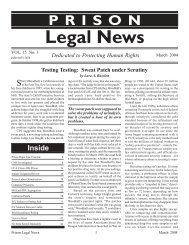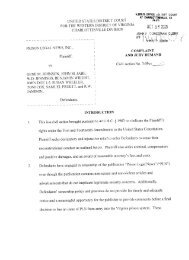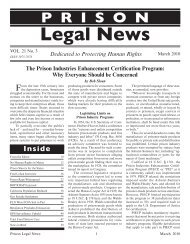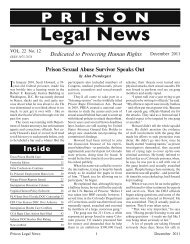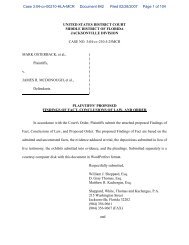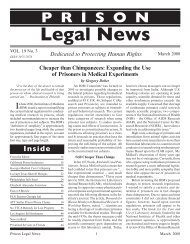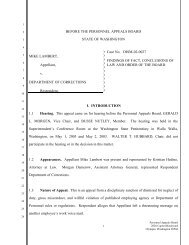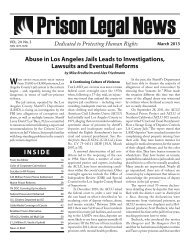From the Editor - Prison Legal News
From the Editor - Prison Legal News
From the Editor - Prison Legal News
You also want an ePaper? Increase the reach of your titles
YUMPU automatically turns print PDFs into web optimized ePapers that Google loves.
Cost Shifting (cont.)<br />
legality of jail fees hinges on how courts<br />
classify <strong>the</strong> fee – as punishment, a tax, or<br />
a user fee. It also depends upon whe<strong>the</strong>r<br />
procedural safeguards are in place to<br />
ensure state officials do not abuse <strong>the</strong>ir<br />
fee collection powers or take money from<br />
someone o<strong>the</strong>r than a “bad guy.”<br />
Still, <strong>the</strong> dissenting opinion in <strong>the</strong><br />
Washington Supreme Court case upholding<br />
automatic deductions offers a<br />
straightforward critique of <strong>the</strong> problem<br />
with automatic deductions from prisoner<br />
accounts that could easily apply to all<br />
forms of cost-related assessments:<br />
“I have scratched my head more than<br />
once trying to determine what public good<br />
is promoted by a statute that essentially<br />
authorized <strong>the</strong> seizure of 35 percent of<br />
every cent that a prison inmate’s spouse<br />
sends to <strong>the</strong> inmate. While I do not know<br />
this fact for certain, I feel comfortable<br />
believing that many, if not most, of<br />
<strong>the</strong> spouses of inmates are low income<br />
individuals and that some may even be<br />
beneficiaries of forms of public assistance.<br />
Consequently, <strong>the</strong> money <strong>the</strong>y send to <strong>the</strong><br />
prisons may not be easy for <strong>the</strong>m to acquire.<br />
When <strong>the</strong> State takes almost half of<br />
this money from <strong>the</strong> grasp of <strong>the</strong> inmate,<br />
<strong>the</strong> needs of <strong>the</strong> inmate will often have to<br />
be met by ano<strong>the</strong>r contribution from <strong>the</strong><br />
spouse. These spouses, who are mostly<br />
women, must <strong>the</strong>n dig deep again if <strong>the</strong>y<br />
are to offset <strong>the</strong> State’s cut. In doing so<br />
<strong>the</strong>y undoubtedly deprive <strong>the</strong>mselves of<br />
funds that could be devoted to <strong>the</strong> purchase<br />
of necessities for <strong>the</strong>m and <strong>the</strong>ir<br />
children. Such a scheme strikes me as not<br />
only unwise but unfair. 79 ”<br />
The Cost of Staying Out of Jail<br />
While <strong>the</strong>re are currently no contemporary<br />
studies of probation fee collection<br />
practices, evidence of national trends,<br />
most notably that documented by <strong>the</strong><br />
Vera Institute of Justice, 80 suggests <strong>the</strong><br />
number of jurisdictions charging probationer<br />
supervision fees has grown since a<br />
1986 NIC survey concluding that nearly<br />
half of states <strong>the</strong>n had probation supervision<br />
fees in place. That survey found 24<br />
states assessed fees for adult supervision<br />
services, typically “rang[ing] from $10 to<br />
$50 per month,” 5 states assessed fees for<br />
adult investigations/pre-sentence reports,<br />
typically “rang[ing] from $75 to $300<br />
per report,” that 5 states assessed fees<br />
for specific programs (e.g. drug/alcohol<br />
April 2008<br />
monitoring or treatment programs); and<br />
3 states assessed fees for juvenile supervision<br />
and investigation). 81 According to<br />
<strong>the</strong> American Probation and Parole Association,<br />
“[m]ost long-range economic<br />
forecasts point to a continued increased<br />
competition for declining public revenues.<br />
In this economic environment, it<br />
is reasonable to conclude that <strong>the</strong> trend<br />
towards charging supervision fees will<br />
continue.” 82<br />
Probation administrators have expressed<br />
differing opinions about <strong>the</strong><br />
use of probation service fees, with some<br />
being “adamantly oppose[d]” to <strong>the</strong>m,<br />
while o<strong>the</strong>rs believe supervision fees help<br />
secure programs “central to fulfilling<br />
[<strong>the</strong>ir] mission.” 83 The role of probation<br />
departments in recouping fees from<br />
probationers varies from jurisdiction to<br />
jurisdiction. In some, probation agencies<br />
may not be responsible for collection of<br />
fees, in o<strong>the</strong>rs, <strong>the</strong>y may collect payments<br />
on all economic sanctions -- from victim<br />
restitution, to court costs, to probation<br />
service fees. Payment of <strong>the</strong> range of<br />
economic sanctions is often a condition<br />
of successful probation.<br />
One study has found that “[p]robation<br />
officers generally believe that collecting<br />
fees takes too much time and infringes<br />
on <strong>the</strong>ir ability to do what <strong>the</strong>y consider<br />
to be important duties.” 84 To increase <strong>the</strong><br />
likelihood of fee recovery some counties<br />
use collection of fees as a method of<br />
evaluating <strong>the</strong>ir probation officers’ overall<br />
performance. 85<br />
The monthly payments sought by<br />
probation are sometimes steep, as are <strong>the</strong><br />
consequences for <strong>the</strong>ir non-payment. In<br />
Louisiana, for example, individuals on<br />
probation may be required to pay a probation<br />
supervision fee of up to $100 per<br />
month, and a court can condition probation<br />
on payments to various system-related<br />
funds including those for indigent defense,<br />
<strong>the</strong> criminal court, victim compensation<br />
and privately funded crime stoppers organizations,<br />
as well as reimbursement for<br />
o<strong>the</strong>r court and law enforcement costs. 86<br />
If a condition of probation is violated, <strong>the</strong><br />
individual is subject to arrest which can<br />
lead to imposition of additional probation<br />
conditions, increased supervision, incarceration,<br />
or revocation. 87 In Ohio, a court<br />
can order probationers to pay up to a $50<br />
monthly supervision fee as a condition of<br />
probation. Failure to pay may warrant<br />
<strong>the</strong> imposition of additional community<br />
control sanctions, 88 or a modification of<br />
<strong>the</strong> offender’s sentence. 89 In Arizona, for<br />
8<br />
example, officials will extend a person’s<br />
probationary period until restitution has<br />
been fully paid off. 90 Non-payment or<br />
late payment may lead to <strong>the</strong> imposition<br />
of collections fees and interest creating a<br />
financial hole for probationers. 91<br />
A Texas study established that “70.8%<br />
of those with unstable employment histories<br />
. . . had negative probation outcomes.<br />
. . .” 92 Paradoxically it also found that<br />
Harris County judges were more likely<br />
to impose miscellaneous fees and fines on<br />
probationers with unstable employment<br />
histories than those with stable histories. 93<br />
Ano<strong>the</strong>r study shows probationers in rural<br />
counties have a higher chance of being<br />
assessed probation supervision fees than<br />
those in urban counties. 94<br />
Arizona has made its county probation<br />
agencies responsible for collecting<br />
all economic sanctions, and has even<br />
determined <strong>the</strong> precise order by which<br />
sanctions are to be paid. Payment of<br />
restitution, for example, is given <strong>the</strong><br />
highest priority, while payment of <strong>the</strong><br />
“prison construction and operations fee”<br />
is number seven on <strong>the</strong> list. 95 Arizona discourages<br />
court modification of payment<br />
orders, instructing probation officers to<br />
“nei<strong>the</strong>r request that <strong>the</strong> Court adjust <strong>the</strong><br />
payment amount or frequency of payment,<br />
nor request that <strong>the</strong> Court delete<br />
or exonerate any delinquency or order of<br />
Probation Service Fee during <strong>the</strong> term of<br />
probation.” 96 The American Probation<br />
and Parole Association has noted that<br />
“[o]f all factors affecting collections, <strong>the</strong><br />
degree of access to fee payments is <strong>the</strong><br />
most significant. Organizations which are<br />
able to keep part or all of <strong>the</strong> supervision<br />
fees collected, collect more.” 97<br />
In 1997 <strong>the</strong> Georgia legislature passed<br />
a law placing supervision of misdemeanor<br />
probationers in <strong>the</strong> hands of private companies.<br />
The supervision fee <strong>the</strong> company<br />
charged contributed to Sabrina Byrd’s<br />
jailing in 2003. Byrd, <strong>the</strong> single mo<strong>the</strong>r<br />
of three, had never been involved in <strong>the</strong><br />
criminal justice system. That changed,<br />
however, when she failed to pay misdemeanor<br />
fines associated with failure to<br />
leash her dogs. Unable to pay <strong>the</strong> fees,<br />
which totaled $852, she was placed by <strong>the</strong><br />
court on probation and devised a payment<br />
plan requiring her to both pay down fines<br />
plus a monthly service fee of $39 charged<br />
by a private probation supervision company.<br />
The Court’s imposition of <strong>the</strong> $124<br />
monthly payment was too much for Byrd<br />
to pay. She stopped showing up for probation<br />
meetings and was arrested and jailed<br />
<strong>Prison</strong> <strong>Legal</strong> <strong>News</strong>



